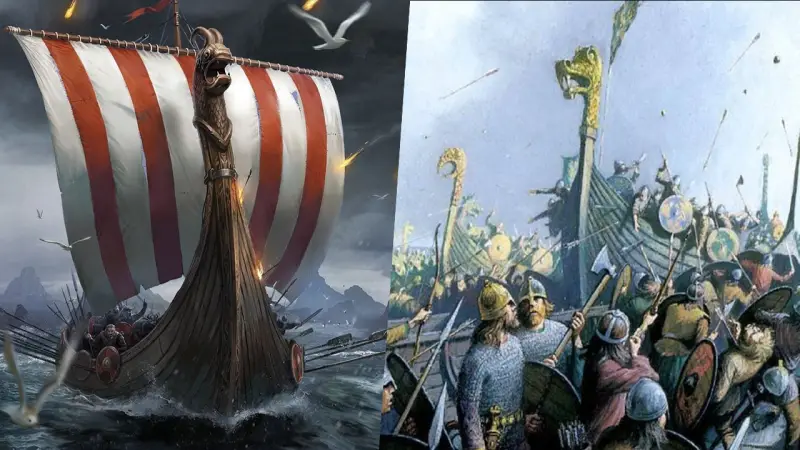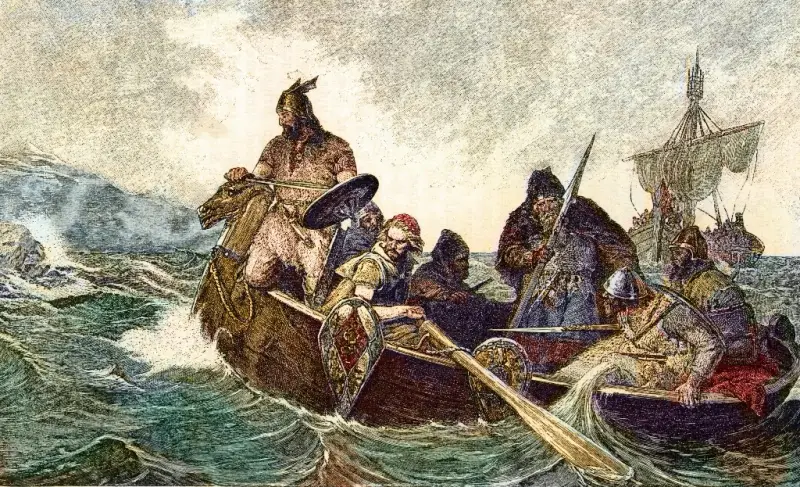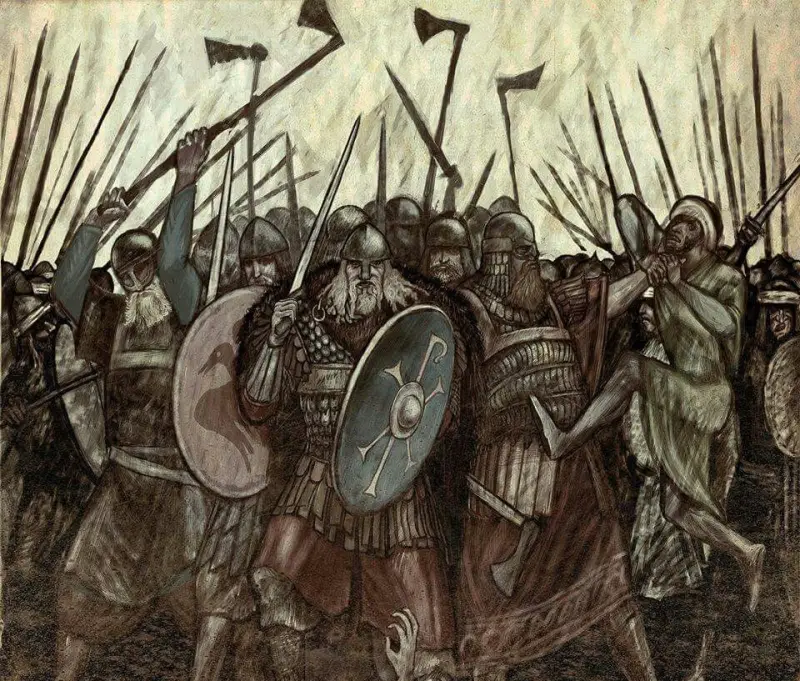“Free initiative of free people”: about the tradition of Viking campaigns among the ancient Scandinavians

С historical From a point of view, the Viking Age is considered to be the period of Scandinavian expansion, the beginning of which is associated with the attack on the English monastery of St. Cuthbert on the island of Lindisfarne in 793, and the end with the battles of Stamford Bridge and Hastings in 1066. However, as many researchers note, in fact, the tradition of military campaigns developed among the Scandinavians much earlier.
In particular, historian and specialist in Scandinavian studies Alexander Khlevov in his book “Harborgs of the Vikings. Northern Europe I–VIII centuries.” notes that the way of life of Scandinavian society, in which the most important component was played by predatory and trading campaigns, was fully formed already in the Vendel era. In the vastness of the Baltic Sea, the Scandinavians tested and perfected all those forms of expansion and cultural export that were directed to Western Europe after 793. In this sense, the Viking Age began at least three centuries before its “official” beginning [1].
For a long time, Viking campaigns were an integral part of the Scandinavian culture, a tradition that was followed from generation to generation. The Viking Age was something of a high point for Scandinavia, with its contribution to world history being extremely significant.
However, despite the fact that the Viking Age and the Vikings themselves are widely known concepts, historians still cannot determine for certain who the Viking really was, since discrepancies immediately arise depending on the point of view adopted by the historian.
Who really were the Vikings? What was the Viking campaign like? What did such a campaign mean for the Scandinavian? We will try to answer these questions in this material.
On the etymology of the term "Viking"

Who really were the Vikings?
As mentioned above, there is no consensus on this matter, but there are versions that are convincingly argued enough to be taken as a basis.
The German historian Rudolf Simek writes in one of his articles that in the modern scientific community it is generally accepted that the term “Vikings” covers two different groups of people: on the one hand, the population of Scandinavia of the Viking Age, men, women and children, and on the other - apparently all-male ship crews of pirates [2].
A number of historians believe that the term "Viking" originates from the word "vík", which is translated from Old Norse as "cove", "bay" or "fjord". That is, a Viking is supposedly a “man from the bay” [4]. Some historians even define the Vikings as “inhabitants of Scandinavia engaged in farming and fishing,” which is fundamentally wrong in its essence.
All dictionaries on ancient Scandinavia, even on the medieval language of Iceland and Norway, offer two and sometimes three main interpretations of the term víkingr, but first of all the word "Viking" can be interpreted as "sea warrior, someone who takes part in víking" [2].
According to the version of the Swedish scientist Fritz Axberg, proposed back in 1944, a Viking is a person who went on a campaign for prey, left his clan and family and broke with his usual way of life. This definition is most consistent with historical reality, and it is taken as a basis by many authoritative Scandinavians. The author of this article also considers it the most convincing.
There is another version that deserves attention, put forward by the Swedish researcher Bertil Daggfeldt. According to his theory, the word "Viking" comes from the same root as the Old Norse phrase "vika sjóvar", meaning "the interval between the changes of rowers." That is, “Vikings” could initially be called “people rowing in shifts” [4].
Thus, the term "Viking" was not ethnic. There is no doubt that the vast majority of Vikings were Scandinavians (i.e., a group of Germanic tribes with the corresponding ethnic characteristics), but one could not be born a Viking, one could only become one by going on a military campaign for prey.
The term Viking is to some extent close to the late European terms “corsair” and “pirate”, but it had its own specifics. And it existed primarily for internal use in the Scandinavian environment. To the rest of the world, the Vikings were Varangians, Normans, Danes, etc. [3].
Before completing this section, one more important remark should be made - some publicists who do not know history well, for some reason believe that the term “Viking” did not appear during the Viking period, but later, and the Scandinavians themselves allegedly did not use it. In fact, as mentioned above, it was precisely the Scandinavian term for internal use. The words “Vikings” and the phrase “Viking campaign” appear quite often in the sagas. For example, in the Saga of Egil there is the following passage:
And in the “Saga of the Volsungs” it is written:
What was the significance of the Viking campaign for the Scandinavians?
As the historian A. Khlevov rightly notes, the term Viking did not have a uniquely negative and positive connotation. A person who went on campaigns and gained fame and wealth for himself was assessed primarily from the position of the one on whose side the narrator and listeners of the saga were [3]. If we were talking about a relative, an ancestor, “our” king or jarl, then he was a “good Viking.” If we were talking about a stranger, then the Viking’s assessments were purely negative.
Here, for example, is an excerpt from Egil's Saga about a bad Viking:
But here is a completely different assessment of the Viking as a very worthy person:
In connection with such polar assessments of the Vikings in the same saga, the question arises - what did the Viking campaign mean for the Scandinavians?
To begin with, it should be noted that belonging to a certain culture means accepting and using a certain, traditional for a given community or group, way of solving a range of problems that a person faces during his life. Culture is very close to tradition [1].
If we talk about ancient Germanic society, then in it fame was an absolute value. As the Danish historian Wilhelm Grönbeck wrote, for the North Germans, name and good fame were enough to get rid of the fear of death, since posthumous fame was for them a real life, which continued in the fortune and honor of his relatives [7].
The personal reputation, the “public image” of every notable warrior, not to mention the leader, meant extremely much to him and his relatives [3]. And Viking campaigns have long been an integral part of Scandinavian culture. They were also a kind of social elevator, with the help of which it was possible not only to increase the glory of one’s family, but also to acquire wealth.
The vast majority of Scandinavians considered participation in a military campaign as a temporary activity, a risky undertaking, participation in which was almost obligatory. The sons of the Vikings followed the path of their fathers, spending their youth on campaigns [3]. Such enterprises were certainly prestigious, and the person who participated in them was respected in society.
What was the Viking campaign like?

As A. Khlevov notes, the Viking movement had an extremely broad social base. Every free man and youth could become one of the Vikings. It was among the Scandinavians in the Viking Age that the private campaign, an action organized at one’s own peril and risk, acquired the widest scope [3]. In essence, the Viking campaign was a free initiative of free people.
Both family men, and very often young people, organized sea raids. Vikings could be divided into two categories: amateurs and professionals. Amateurs were those who went on occasional sea voyages (this was the majority), and professionals were those for whom Viking voyages were a way of life.
It should be noted that the sagas quite clearly limit the Viking campaigns and trade operations, since they required completely different material preparation [3]. Nevertheless, sometimes a raid could not be a purely commercial or purely military operation; everything depended on the prevailing circumstances. Therefore, the participants of the campaign were always ready for anything.
For example, in the same “Saga of Egil”, which has already been quoted here, a detachment of Vikings is engaged in both robberies and peaceful trade:
The Vikings most often went on campaigns in the spring or summer, as soon as the weather allowed. In winter, they were engaged in housekeeping and planning military operations. The degree of Viking activity in a particular area varied, as did the number of squadrons.
The sagas have preserved a lot of evidence of how ordinary householders go on Viking expeditions, plan expeditions and organize a team. For example, in “Njal's Saga” Gunnar, a respected Icelandic bond, goes on a campaign, tempted by the offer of a Norwegian acquaintance.
The Viking campaigns in the first half of the XNUMXth century were characterized by uncoordinated raids by individual detachments of seekers of profit and adventure. Amazed by the ease with which the Vikings achieved their goals, Western chroniclers sometimes greatly exaggerated the number of Viking warriors and ships.
Tales of the horrors of Norman attacks were also often exaggerated, which contributed to the demonization of the Viking campaigns. What is noteworthy is that the Vikings themselves approved of spreading scary stories about their campaigns in order to frighten their potential victims, who preferred flight to such horror, and ultimately capture the prey with minimal losses.
I would like to complete this material with the words of the French writer Jean Mabire, who wrote the following about this era in a rather colorful style:
Использованная литература:
[1]. Khlevov A. A. Harbingers of the Vikings. Northern Europe I–VIII centuries. (2nd edition). St. Petersburg: Eurasia, 2015.
[2]. The most ancient states of Eastern Europe. 1999: Eastern and Northern Europe in the Middle Ages. Rep. ed. G. V. Glazyrina. M., Eastern literature, 2001.
[3]. Khlevov A. A. Who are the Vikings. – St. Petersburg: “Eurasia”, 2021.
[4]. Zergius Vankuker. Scandinavia. Full story. M., AST, 2021.
[5]. The Saga of Egil / trans. S. S. Maslova-Lashanskaya, V. V. Koshkin and A. I. Korsun // Icelandic sagas: in 2 volumes. St. Petersburg: Neva, Summer Garden, 1999.
[6]. Saga of the Volsungs / Trans. B.I. Yarkho // Roots of Yggdrasil. M., 1997.
[7]. Grönbek V. The Viking Age: the world of the gods and the world of people in the myths of the northern Germans / Per. from English. E. V. Lamanova. – M.: Tsentrpoligraf, 2019.
[8]. Mabire J. Vikings, kings of storms. – M., Totenburg, 2023.
Information